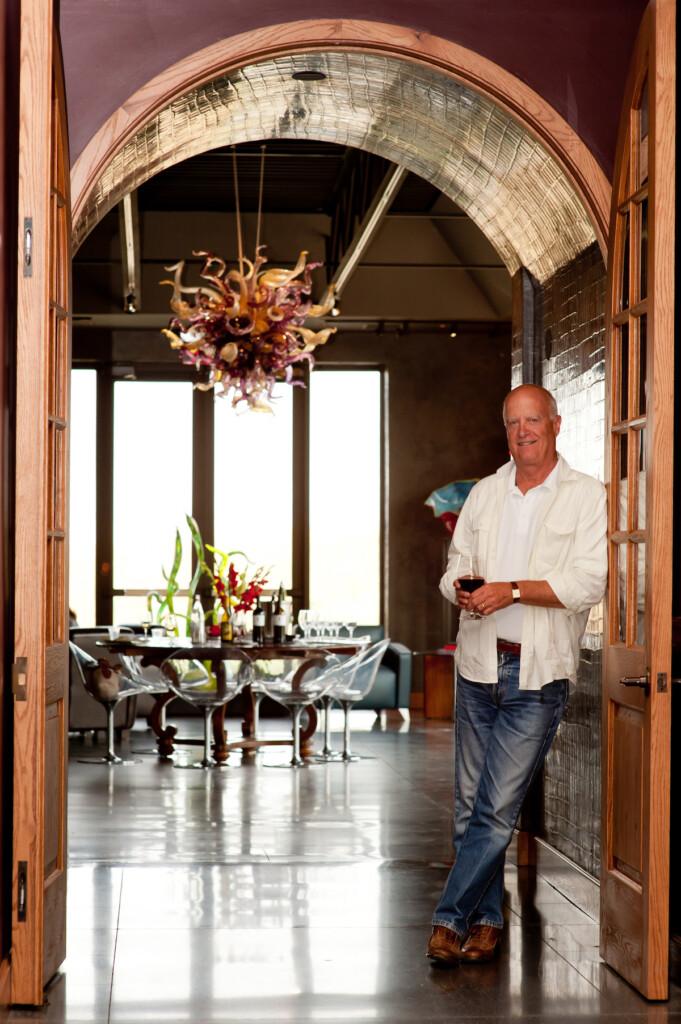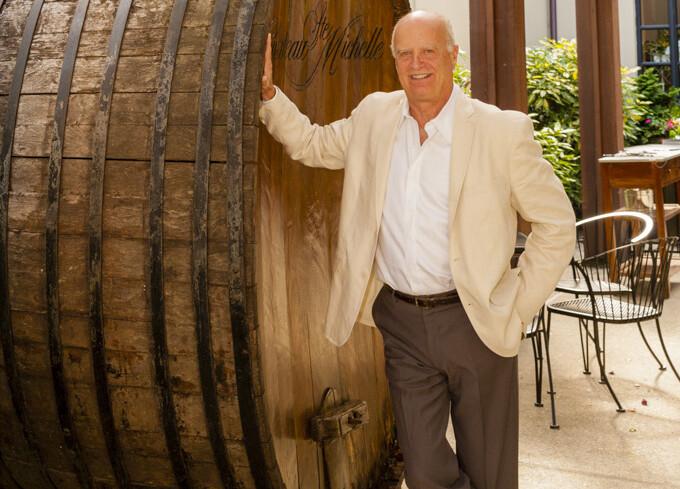
The late Allen Shoup, a man of élan and prescience worthy of an autobiography, was too modest for that.
While mine is a life with few regrets, his passing on Nov. 7, 2022 at age 79 meant I missed the opportunity to help share his remarkable story in long form with many chapters. I wanted it to be a book about him in his words. I couldn’t believe one hadn’t been written.
However, I learned why. He only agreed to be interviewed for such a project if it was “the overarching story is how the Washington wine industry got to where it is today.” That came via my friend Katie Sims, Allen’s longtime communications lead from their days at Château Ste. Michelle, Stimson Lane’s headquarters in Woodinville.
Alas, getting a new wine magazine off the ground got in my way this past summer. At the same time, Allen’s failing health and his visual perception grew dim, despite multiple eye surgeries. It was agonizing for a man praised in every obituary as “the visionary” for the Washington wine industry.
One of the proudest days of my life as a journalist came Aug. 8, 2019, when I drove up to Allen’s home near Seattle Golf Club for lunch with him. I’ve been fortunate enough to play 18 holes there, so I knew how to drive to the security gate, a stone’s throw from the clubhouse. However, twice I got lost trying to find his estate. Twice I had to make an embarrassing call to Allen, asking for a bit more guidance. My embarrassment would grow soon after I arrived. He asked if I wouldn’t mind driving us to the club because of his vision. I couldn’t say no, but the notion of one of the wine world’s luminaries riding in my 2010 Honda Civic was humbling for me. And yet, Allen didn’t flinch as he stooped down and folded himself into the passenger seat.
Then again, Allen’s unpretentious nature made him the type of gentleman who somehow turned a simple pair of blue jeans into a subtle fashion statement. He seemed so comfortable in them, which in turn also made him approachable. I will always picture him seated in a handcrafted chair with a glass of wine in his left hand, wearing a crisply pressed dress shirt, a sweater or vest, and a pair of jeans. He made a statement by being understated. As the late Vin Scully would say, “He was as cool as the other side of the pillow.”
Fortunately, Spokane journalist Jim Kershner — who wrote a piece about my friend Andy Perdue in 2020 — conducted a sit-down interview with Allen on Aug. 29 for an invaluable memoir of Washington wine history. That work at HistoryLink.org was sponsored by the Washington State Wine Commission. It was published less than two weeks before Allen’s death and led to this essay by Kershner.
After all the grapes from the 2022 vintage were processed, Gilles Nicault, the longtime winemaker for Long Shadows Vintners, shared a heartfelt tribute in a letter to Allen’s prized club members.
“The last day of the 2022 harvest at Long Shadows Vintners was marked by both the completion of our 20th harvest and our founder Allen Shoup’s passing,” Nicault wrote. “Allen was a humble gentleman; compassionate, dedicated and passionate. Allen was not only my boss, but an incredible mentor and father figure.”
Allen’s genius included a keen eye when it came to winemaking talent, first at Stimson Lane, where he started in 1980, and later for Long Shadows, which he created in 2002. Nicault was at famed Woodward Canyon Winery when he reached out to Allen about becoming his resident winemaker. The chance to work alongside some of the world’s most acclaimed winemakers — who became part-owners at Long Shadows — was heady stuff.
“I told Allen that it was such a great opportunity for Gilles and I was happy for him,” Rick Small shared with me for a cover story on Long Shadows when it was named Pacific Northwest Winery of the Year in 2018 by Wine Press Northwest Magazine.
Among those storied figures is acclaimed Napa Valley vintner Agustin Huneeus Sr., head of the famous Chilean family behind the Pirouette label for Long Shadows. His decades-long view of Allen’s career provides a perspective from beyond the Pacific Northwest.
“He was to Washington wines what his friend and mentor Robert Mondavi was to Napa Valley,” Huneeus said.
Legacy includes creating Auction of Washington Wines

It’s no coincidence that Mondavi’s work to launch the hugely successful Napa Valley Wine Auction prompted Shoup to create the Auction of Washington Wines and stage it at Château Ste. Michelle. Since it began in 1988, it has raised more than more than $59 million for Seattle Children’s Hospital and wine-related research at Washington State University.
“Of all the lucky things I’ve been affiliated with in my lifetime, this is one I hold most significant,” Allen told me in 2013. “It was truly an opportunity to give back and an opportunity for our entire industry — which has so much to be grateful for — because there’s probably not a person in Washington who has been here awhile who doesn’t know someone who’s benefited from the services of Children’s Hospital.”
Shoup’s constellation of friends and collaborators included artist Dale Chihuly, internationally renowned winemakers Piero Antinori of Tuscany, Germany’s Ernst Loosen — and Mondavi.
While it was E. & J. Gallo who first recruited Shoup into the world of wine, his admiration for Mondavi and association with him over the years helped inspire the innovation that Shoup embraced throughout his career.
Within three years of arriving at Stimson Lane Vineyards & Estates, Shoup was elevated to president and CEO for what has become Ste. Michelle Wine Estates — now the eighth-largest wine company in the U.S.
Bob Betz, the winemaking Master of Wine whose career as an executive with Stimson Lane/Ste. Michelle overlapped that of Shoup, points out that in 1980, there were fewer than 20 wineries in the state. And much of Stimson Lane’s inventory included wines made with either hybrid grapes or other fruit rather than the classic vinifera grapes of the Old World that now was making California famous.
“He just saw things differently from the rest of us and had the strength of his conviction to make it happen,” Betz says. “He had this vision of where the company could be and where the industry could be in the next 10-20-30 and 40 years. We’re seeing the fruits of his vision that helped build Washington into a global player in the world wine industry.”
And yet, Allen credited U.S. Tobacco of Connecticut, the owners of Stimson Lane, for the capital and commitment to turn his ideas into reality. While he often spoke of his good fortune, the string of success proved Allen to be prophetic rather than lucky.
He realized the importance of defined growing regions and their role in marketing wine to consumers, so he hired noted researcher Walter Clore and winemaking plant pathologist Wade Wolfe to petition the federal government in hopes of establishing the Columbia Valley American Viticultural Area. That designation in 1984 would help define the entire Washington wine industry, not just Stimson Lane products.
Allen also admired Opus One in the Napa Valley — Mondavi’s partnership with France’s famed Rothschild family. That encouraged him to cultivate connections with generational leaders in the Old World. Col Solare came to life with the storied Antinori family in 1995, and the German-inspired Eroica Riesling partnership with Ernst Loosen took root in 1999.
“Relationships and collaborations were fundamental to Allen,” Betz said.
By 2000, Allen saw changes on the horizon surrounding UST. He moved on and began working on Long Shadows, an ultra-premium portfolio of brands dedicated to Columbia Valley grapes. It allowed him to turn some of his relationships into formal collaborations that came with a 25% interest in their respective labels.
The brands represent iconic figures such as Michel Rolland from Bordeaux, John Duval of Penfolds Grange fame in Australia, Ambrogio and Giovanni Folonari in Tuscany, noted German Riesling producer Armin Diel and a trio from the Napa Valley — Huneeus, his winemaker Philippe Melka and Cab producer Randy Dunn. Their urban-chic tasting gallery west of Walla Walla features glass work by Chihuly.
Within five years of its opening, Long Shadows was named Food & Wine Magazine’s Winery of the Year.
Shoup grew up in the suburbs of Detroit, Mich., and received a business degree from the University of Michigan. He added a master’s degree in psychology from Eastern Michigan while working for Chrysler, then got drafted into the Army during the Vietnam War. That background in psychology meant he spent much of his two years of service at the Pentagon.
He was discharged in 1969 and returned to Michigan, where he worked in product development at Amway, which included fragrance formulation. A headhunter found him for E. & J. Gallo Wines, which coveted his marketing expertise. After three years, Hollywood cosmetics giant Max Factor wooed him away.
While that time with Gallo proved to be the turning point in Allen’s life, a stint as communications director for Boise Cascade in Idaho added experience he would draw upon to encourage media across the country to raise awareness for not only Stimson Lane wines, but also others from Washington state.
In 2013, Allen was chosen as the Honorary Vintner for the Auction of Washington Wines. Other recognition he took pride in included serving as a longtime board member of the Pacific Northwest Ballet and being selected for Sunset Magazine’s Lifetime Achievement Award, as wine critic Robert Parker’s Wine Personality of the Year, being named to the Legends of Washington Wine Hall of Fame and winning the American Wine Society Award of Merit. He was asked to deliver a eulogy for Mondavi in 2008.
He is survived by his wife Kathleen, son Ryan Shoup (Aubrey), stepson Dane Narbaitz (Sara) and three grandchildren. Both sons have been in leadership positions at Long Shadows for years, so the brand and the new satellite tasting room set to open in Woodinville are in capable hands. Last summer, USA Today named their Walla Walla tasting room as the best in the U.S.
Not long before he passed away, Allen was assiduous in sharing with family members ideas of a restaurant concept for Long Shadows that he dreamed would someday earn a Michelin star. So apropos — as was the showing of the 2018 Pedestal as one of the top examples of Merlot at our 2022 Platinum Awards and representative of the collaborative effort he fostered between Nicault and Rolland.
“Allen named our winery Long Shadows to honor the acclaimed international winemakers he brought to Washington, but as our family reflects on it now, the name also seems a fitting tribute to Allen’s vision, influence and leadership. He left an indelible mark and will always be our guiding force,” said Narbaitz, who carries on as president of Long Shadows Vintners.
When I asked the family about plans for a memorial service, they replied, “In lieu of a service, and at Allen’s request, he asked to be memorialized with a lively discussion among loved ones when admiring beautiful art or enjoying a glass of Washington wine.”
The bottles that might have meant the most to Allen were the Chester-Kidder Red Wine and Julia’s Dazzle Rosé — which he named for family members.
Soon after his death, The Seattle Times had me write a formal obituary about Allen. This is my personal tribute to him. Each one left me somewhat dispirited because neither comes close to what this lodestar deserves.

Leave a Reply